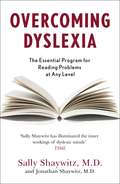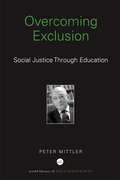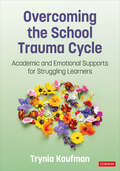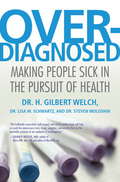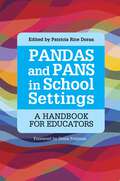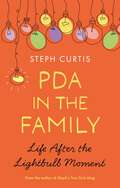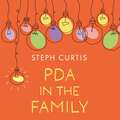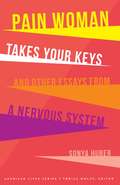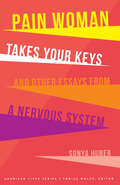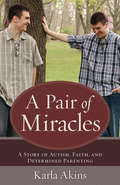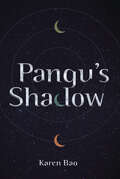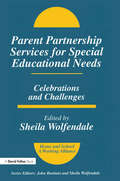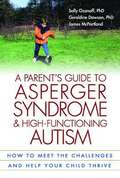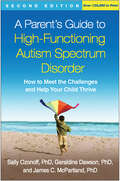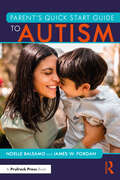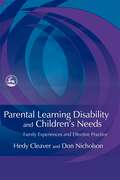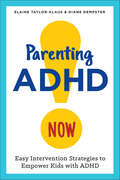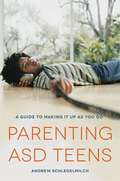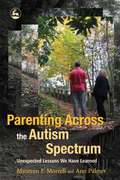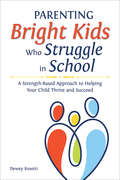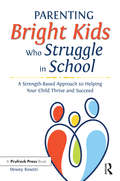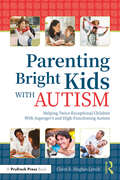- Table View
- List View
Overcoming Dyslexia: Second Edition, Completely Revised and Updated
by Sally E. Shaywitz Jonathan ShaywitzA major update and revision of the essential program for reading problems at any level, incorporating the latest breakthroughs in science, educational methods, technology and legal accommodations. 'Sally Shaywitz is an amazing woman... no one has a better understanding of dyslexia' - Bob DylanDyslexia is the most common learning disorder in the world, affecting one in five individuals. Now Drs Sally and Jonathan Shaywitz give us a substantially updated and augmented edition of her classic work, Overcoming Dyslexia, drawing on an additional fifteen years of ground-breaking scientific research to offer new information on both the big picture and the specific details of dyslexia and reading problems, and providing the tools that parents, teachers and dyslexic individuals of any age need. This updated edition offers:* New chapters on the latest science-based diagnosis of dyslexia, identifying the at-risk child, dyslexia in post-menopausal women, and implications of associated anxiety and ADHD in dyslexia* State-of-the-art information on universal screening for dyslexia as early as the first year of school - why and how to efficiently and effectively screen young children* An expanded chapter on choosing the best school for a dyslexic child and new chapters examining exciting innovative school models* New chapters focused on higher education, including preparing a dyslexic for university, choosing a university or higher education course for a dyslexic student and making the university experience work* The latest advances in digital technology that increase a dyslexic's ability to help him or herself* Extensively updated material on helping dyslexic individuals of all ages become better readers, with detailed home programs to enhance reading at different ages and levels* How to use compassion and exciting new knowledge to build and strengthen a child's self-esteem and resilience * Insightful stories of outstanding men, women and young adults who are dyslexic and thriving and how they succeeded. Acclaimed by experts and parents alike, Overcoming Dyslexia provides anyone who is struggling with reading problems with the necessary reassurance that, through hard work and the right help, such difficulties can be overcome.
Overcoming Exclusion: Social Justice Through Education (World Library of Educationalists)
by Peter MittlerIn this Collected Works, Professor Peter Mittler brings together twenty-one of his key writings in one essential volume, providing a distinctive commentary on some of the most important issues in education over the last thirty years. This unique collection illustrates the development of Professor Mittler’s thinking over the course of a long and esteemed career, encompassing his work on the origins of under-achievement, the ways in which obstacles to learning can be understood and overcome and the importance of human rights for all marginalised minorities. It follows the thread of his growing awareness that human development depends on a series of complex interactions between the ‘double helix’ of nature and nurture. One of the world’s most respected and eminent scholars of the field of special needs and inclusive education, Professor Mittler includes chapters from his best-selling books and selected articles from leading journals, providing the reader with a chronological and global perspective on his work and thinking, and the impact it had at and beyond the time of writing.
Overcoming the School Trauma Cycle: Academic and Emotional Supports for Struggling Learners
by Trynia KaufmanDisrupt the painful cycle of academic challenges and emotional distress When students struggle with learning, it can be stressful for both them and their teachers. Struggling learners are more likely to experience low self-esteem, anxiety, depression, and behavioral issues—challenges that, combined with highly stressful learning experiences, can tip students into a trauma response that makes learning even harder. Overcoming the School Trauma Cycle explores the science behind how learning occurs in the brain, how it can be disrupted, and—most importantly—how to overcome the painful cycle of academic challenges and emotional distress. Inside, you′ll find: What the latest research tells us about how mental health issues can disrupt the learning process How academic and mental health challenges can fuel each other Manageable, whole-class practices and targeted supports to meet struggling learners’ academic and emotional needs Opportunities to self-assess and reflect Many schools have increased their focus on trauma-informed teaching and social-emotional learning, but these approaches are too often pitted against academic rigor when they are really two sides of the same coin. To improve outcomes for all students, we must address their social-emotional needs alongside their academic ones. In Overcoming the School Trauma Cycle, you′ll discover empowering practices to help all students learn and thrive.
Overcoming the School Trauma Cycle: Academic and Emotional Supports for Struggling Learners
by Trynia KaufmanDisrupt the painful cycle of academic challenges and emotional distress When students struggle with learning, it can be stressful for both them and their teachers. Struggling learners are more likely to experience low self-esteem, anxiety, depression, and behavioral issues—challenges that, combined with highly stressful learning experiences, can tip students into a trauma response that makes learning even harder. Overcoming the School Trauma Cycle explores the science behind how learning occurs in the brain, how it can be disrupted, and—most importantly—how to overcome the painful cycle of academic challenges and emotional distress. Inside, you′ll find: What the latest research tells us about how mental health issues can disrupt the learning process How academic and mental health challenges can fuel each other Manageable, whole-class practices and targeted supports to meet struggling learners’ academic and emotional needs Opportunities to self-assess and reflect Many schools have increased their focus on trauma-informed teaching and social-emotional learning, but these approaches are too often pitted against academic rigor when they are really two sides of the same coin. To improve outcomes for all students, we must address their social-emotional needs alongside their academic ones. In Overcoming the School Trauma Cycle, you′ll discover empowering practices to help all students learn and thrive.
Overdiagnosed: Making People Sick in the Pursuit of Health
by H. Gilbert WelchFrom a nationally recognized expert, an exposé of the worst excesses of our zeal for medical testingGoing against the conventional wisdom reinforced by the medical establishment and Big Pharma that more screening is the best preventative medicine, Dr. Gilbert Welch builds a compelling counterargument that what we need are fewer, not more, diagnoses. Documenting the excesses of American medical practice that labels far too many of us as sick, Welch examines the social, ethical, and economic ramifications of a health-care system that unnecessarily diagnoses and treats patients, most of whom will not benefit from treatment, might be harmed by it, and would arguably be better off without screening.Drawing on twenty-five years of medical practice and research on the effects of medical testing, Welch explains in a straightforward, jargon-free style how the cutoffs for treating a person with "abnormal" test results have been drastically lowered just when technological advances have allowed us to see more and more "abnormalities," many of which will pose fewer health complications than the procedures that ostensibly cure them. Citing studies that show that 10 percent of two thousand healthy people were found to have had silent strokes, and that well over half of men over age sixty have traces of prostate cancer but no impairment, Welch reveals overdiagnosis to be rampant for numerous conditions and diseases, including diabetes, high cholesterol, osteoporosis, gallstones, abdominal aortic aneuryisms, blood clots, as well as skin, prostate, breast, and lung cancers.With genetic and prenatal screening now common, patients are being diagnosed not with disease but with "pre-disease" or for being at "high risk" of developing disease. Revealing the economic and medical forces that contribute to overdiagnosis, Welch makes a reasoned call for change that would save us from countless unneeded surgeries, excessive worry, and exorbitant costs, all while maintaining a balanced view of both the potential benefits and harms of diagnosis. Drawing on data, clinical studies, and anecdotes from his own practice, Welch builds a solid, accessible case against the belief that more screening always improves health care.
P.S. Your Not Listening
by Eleanor CraigNo school would take these children. Some were violent. Others were withdrawn. All were deeply disturbed. When Eleanor Craig took on the assignment to teach a class of special children who had been declared "unteachable" by others, she knew it wouldn't be easy. How do you teach long division to a child who believes that the banana in his lunchbox is alive and trying to escape? How do you maintain control when one of your students has locked you in the custodian's closet? How do you convince a child that people are not for hurting when he is constantly battered and rejected at home? During the year in which she taught a "transitional class" of acutely disturbed children, Eleanor Craig grappled with such problems each bewildering and exhausting day. P.S. Your Not Listening is the deeply-felt and often touching account of Mrs. Craig's attempts to reach her five exceptional pupils. Having no guidelines but her own empathy and resourcefulness, Mrs. Craig tries to reach the center of the children's chaotic world and to gain their trust. Gradually, she begins to establish human contact. Gradually, the children become more responsive. But the setbacks are many and the progress painfully slow. Eddie can only speak through aggression. Kevin's shoes tap out his anger. Violent fights flare up between Eddie and Douglas: Julie hides under her desk while Jonathan calls into his inkwell for help and Kevin urges Douglas to kill Eddie. Yet in the lulls between such destructive outbursts, Mrs. Craig perceives a real, if hesitant, sense of community emerging in the classroom. There are moments of celebration, as on the day that Jonathan, who believed he was a ghost and not a real boy, exclaims, "Doesn't it feel funny to wake up in the morning and say 'Who am I?' Doesn't it feel funny to wake up in the morning and be a human being?" P.S. Your Not Listening is ultimately not so much a book about education as a book about love.
PANDAS and PANS in School Settings: A Handbook for Educators
by Darlene Fewster Patricia Rice Doran Janice Tona Kandace M. Hoppin Amy Mazur Diana Pohlman Kathleen Stein Margo ThienemannPANDAS (Pediatric Autoimmune Neuropsychiatric Disorders Associated with Strep) and PANS (Pediatric Acute-Onset Neuropsychiatric Syndrome) occur when an abnormal immune response produces brain inflammation, leading to unusual psychological symptoms in children. Symptoms can include OCD, tics, ADHD, anxiety disorders, sensory issues and marked personality changes. This practical handbook explains how educators can distinguish between these symptoms and pre-existing conditions, and offers strategies for supporting students with PANDAS and PANS in school settings. Contributions from experts provide educators with the understanding needed to be able to collaboratively identify PANDAS and PANS, and carry out effective interventions. As the rate of incidence of PANDAS and PANS increases, this book will be an essential resource for school staff in getting to grips with these complex disorders and overcoming the challenges they present.
PDA in the Family: Life After the Lightbulb Moment
by Steph CurtisIn this honest and open account of life with her PDA daughter, Sasha, Steph Curtis reveals the everyday struggles and explores the milestones of raising a child diagnosed with Pathological Demand Avoidance. This book guides you through the Curtis family's 'lightbulb moment' of recognising Sasha's PDA profile following her autism diagnosis at the age of two, their experiences of various education settings and attempts to access support, everyday life at home and relationships with family and friends. Bursting with practical takeaways and advice from creating personal profiles for your child to help them transition through schools and other settings to the reasonable adjustments you can actually ask for to help make life easier for your PDA child.With unique insights from Sasha's father, sister, and Sasha herself, this book offers insider knowledge, understanding and advice from one family to another. It would also be helpful for those in education, healthcare or other settings to gain a better understanding of Pathological Demand Avoidance.
PDA in the Family: Life After the Lightbulb Moment
by Steph CurtisIn this honest and open account of life with her PDA daughter, Sasha, Steph Curtis reveals the everyday struggles and explores the milestones of raising a child diagnosed with Pathological Demand Avoidance. This book guides you through the Curtis family's 'lightbulb moment' of recognising Sasha's PDA profile following her autism diagnosis at the age of two, their experiences of various education settings and attempts to access support, everyday life at home and relationships with family and friends. Bursting with practical takeaways and advice from creating personal profiles for your child to help them transition through schools and other settings to the reasonable adjustments you can actually ask for to help make life easier for your PDA child.With unique insights from Sasha's father, sister, and Sasha herself, this book offers insider knowledge, understanding and advice from one family to another. It would also be helpful for those in education, healthcare or other settings to gain a better understanding of Pathological Demand Avoidance.
Pain Woman Takes Your Keys and Other Essays from a Nervous System (American Lives Series)
by Sonya HuberRate your pain on a scale of one to ten. What about on a scale of spicy to citrus? Is it more like a lava lamp or a mosaic? Pain, though a universal element of human experience, is dimly understood and sometimes barely managed. Pain Woman Takes Your Keys, and Other Essays from a Nervous System is a collection of literary and experimental essays about living with chronic pain. Sonya Huber moves away from a linear narrative to step through the doorway into pain itself, into that strange, unbounded reality. Although the essays are personal in nature, this collection is not a record of the author’s specific condition but an exploration that transcends pain’s airless and constraining world and focuses on its edges from wild and widely ranging angles. <p><p> Huber addresses the nature and experience of invisible disability, including the challenges of gender bias in our health care system, the search for effective treatment options, and the difficulty of articulating chronic pain. She makes pain a lens of inquiry and lyricism, finds its humor and complexity, describes its irascible character, and explores its temperature, taste, and even its beauty.
Pain Woman Takes Your Keys, and Other Essays from a Nervous System (American Lives)
by Sonya HuberRate your pain on a scale of one to ten. What about on a scale of spicy to citrus? Is it more like a lava lamp or a mosaic? Pain, though a universal element of human experience, is dimly understood and sometimes barely managed. Pain Woman Takes Your Keys, and Other Essays from a Nervous System is a collection of literary and experimental essays about living with chronic pain. Sonya Huber moves away from a linear narrative to step through the doorway into pain itself, into that strange, unbounded reality. Although the essays are personal in nature, this collection is not a record of the author’s specific condition but an exploration that transcends pain’s airless and constraining world and focuses on its edges from wild and widely ranging angles. Huber addresses the nature and experience of invisible disability, including the challenges of gender bias in our health care system, the search for effective treatment options, and the difficulty of articulating chronic pain. She makes pain a lens of inquiry and lyricism, finds its humor and complexity, describes its irascible character, and explores its temperature, taste, and even its beauty.
Pair of Miracles, A: A Story of Autism, Faith, and Determined Parenting
by Karla Akins"A parent's gripping journey of awareness, acceptance, and appreciation of her two boys dealing with significant challenges brought on by autism."--Stephen Mark Shore, EdDWhen Karla Akins hoped that her autistic sons could learn to read and function independently, doctors warned her that those expectations would never be met. She set out to prove that, despite those warnings, all things are possible through God.Laced with humor and compassion, A Pair of Miracles is the heartwarming story of her journey rearing adopted twin sons, each diagnosed with autism and fetal alcohol disorder. This is more than a moving biography from a mom on the front lines, however. It is a powerful tool, full of practical help for parents, educators, and church members working with children who have intellectual disabilities, speech impairments, and other limitations on the autism spectrum. It is also a challenge to the church to welcome and celebrate all the members of their congregation, no matter their abilities.Thanks to Karla's determination, faith, and unconditional love--and contrary to the doctors' predictions--her adult twins are now able to function independently in many ways. They help their dad install pools, do carpentry work, and serve in the church as ushers, sound engineers, and children's ministry workers.For parents seeking hope, answers, and peace, Karla leads the way to all three down a path she's already been.
Palace of the Pigs
by Kaye LawrenceA heartwarming story about a pig ranch that was converted into a home to care for homeless and learning disabled children in Mexico.
Pangu's Shadow
by Karen BaoThere are no second chances in the Pangu Star System. Ver and Aryl, apprentices at the most prestigious biology lab among the system’s moons, know this better than anyone. They’ve left behind difficult pasts and pinned their hopes for the future on Cal, their brilliant but demanding boss. But one night while working late in the lab, they find Cal sprawled on the floor, dead. Murdered. And they immediately become the prime suspects. Their motives seem obvious. Ver, who left her home moon to study the life-threatening disease wracking her body, had a hopeless attachment to Cal that could’ve become twisted by jealousy. Aryl, on the other hand, clashed with workaholic Cal because she valued more in her life than research. To clear their names, Ver and Aryl put aside their mutual suspicion and team up to investigate Cal’s death. As they search for the real murderer, they uncover secrets that have shaped all of Pangu’s moons… and must decide what kind of future they really want.
Parent Partnership Services for Special Educational Needs: Celebrations and Challenges
by Sheila WolfendaleThis book gives a clear understanding of the growth and operation of special educational needs Parent Partnership Services (PPSs). The reader will find an explanation of the broader national and legal context of PPSs, followed by contributions written by Parent Partnership Coordinators and parent workers in various regions. They describe what they actually do, including their work with and support for parents and carers of children with special educational needs. The book includes information on the latest special needs and disability rights legislation; descriptions of innovative good practice in setting up and operating PPSs; case studies from practitioners; advice on how to liaise effectively with other professionals and agencies; guidance on giving and receiving training, especially for independent parental supporters (IPSs); and ways of implementing disagreement resolution schemes. Parent Partnership Coordinators will find this book particularly useful. Special Educational Needs Coordinators, SENCOs, educational psychologists, IPSs and parents will also find it a relevant and timely publication.
Parent's Guide to Asperger Syndrome and High-Functioning Autism
by Sally Ozonoff Geraldine DawsonAsperger Syndrome and high-functioning autism are detected earlier and more accurately today than ever before. Children and teens with these disorders often stand out for their precocious intelligence and language abilities--yet profound social difficulties can limit every aspect of their lives. This hopeful, compassionate guide shows parents how to work with their child's unique impairments and capabilities to help him or her learn to engage more fully with the world and live as self-sufficiently as possible. From leading experts in the field, the book is packed with practical ideas for helping children relate more comfortably to peers, learn the rules of appropriate behavior, and participate more fully in school and family life. It also explains what scientists currently know about autistic spectrum disorders and how they are diagnosed and treated. Real-life success stories, problem-solving ideas, and matter-of-fact advice on everything from educational placements to career planning make this an indispensable reference that families will turn to again and again.
Parent's Guide to High-Functioning Autism Spectrum Disorder, Second Edition: How to Meet the Challenges and Help Your Child Thrive
by Sally Ozonoff Geraldine Dawson James C. McpartlandMany tens of thousands of parents have found the facts they need about high-functioning autism spectrum disorder (ASD), including Asperger syndrome, in this indispensable guide. Leading experts show how you can work with your child's unique impairments--and harness his or her capabilities. Vivid stories and real-world examples illustrate ways to help kids with ASD relate more comfortably to peers, learn the rules of appropriate behavior, and succeed in school. You'll learn how ASD is diagnosed and what treatments and educational supports really work. Updated with the latest research and resources, the second edition clearly explains the implications of the DSM-5 diagnostic changes.
Parent's Quick Start Guide to Autism
by James W. Forgan Noelle BalsamoParent’s Quick Start Guide to Autism provides parents and caregivers with an immediate overview of autism spectrum disorder (ASD) and steps they can take to support and encourage their child. Each chapter is packed with detailed and helpful information, covering what to do at home and at school, how to avoid common mistakes, and how (and when) to seek professional help. Summary and resource sections at the end of each chapter give quick guidance to busy readers. Topics include occupational therapy, applied behavior analysis (ABA), cognitive behavioral therapy (CBT), interventions, and more. Offering straightforward, easy to understand, and evidence-based information, this book is a go-to resource for caregivers parenting a child with autism.
Parental Learning Disability and Children's Needs: Family Experiences and Effective Practice
by Hedy Cleaver Don NicholsonParental Learning Disability and Children's Needs explores how to effectively assess children in families where one or more parent has a learning disability. These children often have unmet needs because their parents are more likely to be coping with mental and physical illness, domestic violence or substance abuse. The book examines current social care practice in this area, whether it is working, and the impact it has on families. The authors describe how, although some parents with a learning disability face a significant risk of losing their children, most continue to look after them and, while support provided by social services and other agencies, can be significant it is rarely sustained and the health and welfare of many children suffers as a result. Case studies and interviews from original research support the authors' recommendations for policy and practice to combat these problems. This book will prove to be an invaluable source of information for all social workers and other professionals working with someone who is both a parent and has a learning disability.
Parenting ADHD Now: Easy Intervention Strategies to Empower Kids with ADHD
by Elaine Taylor-Klaus Diane Dempster"An empathetic, personal and practical approach for parents craving relief from the wide-ranging childhood impact of ADHD."—Mark Bertin, M.D., author of Mindful Parenting for ADHDParents: This book is for you.Most of us need help to overcome the challenges of parenting a child with ADHD. Watching your bright, vibrant child struggle with ADHD can make you feel helpless, especially when you don't have the tools to help them succeed. There is a great deal of help available for children with ADHD, but there simply aren't enough resources for parents of ADHD children—and you need support just as much as your child.The National Institute of Mental Health recognizes that frustration, blame, and anger are common in families with ADHD children. Children with ADHD need guidance and understanding from parents to reach their full potential. Yet it can feel impossible to manage the challenges you experience as a parent in order to be the support your child needs.Diane Dempster and Elaine Taylor-Klaus are ADHD coaches, educators, and the cofounders of ImpactADHD. They started off just like you, feeling frustrated and lost about how to help their ADHD children—and how to take care of themselves as well. Since that time, they have become national leaders in the world of ADHD, representatives of the voice of parents, and the go-to experts for parenting children with ADHD. They have successfully armed thousands of parents with the tools they need to help themselves and their children with ADHD.In Parenting ADHD Now! Diane and Elaine combine their practical know-how and professional expertise to offer immediate, actionable strategies you can use to guide and support your ADHD child compassionately and effectively.The material presented in this book is grounded in three main concepts:Apply the Coach-Approach to Parenting – This unique method gives you permission to pay attention to yourself, build up your own confidence and self-esteem, and apply these tools when working with your child with ADHD.Use Real, Practical Strategies – Learn to effectively navigate the complex terrain of ADHD, confidently minimize ADHD-related stress in your family, and foster your child's independence.Focus on the Parent – This is not about "fixing" your ADHD child. This is about shifting your focus inward and empowering yourself so that you can empower your child as they navigate life with ADHD.You can dramatically improve life for your child with ADHD. With Parenting ADHD Now! you will learn to set healthy limits, find compassion and acceptance, change your habits, laugh instead of cry, understand instead of yell, and thrive instead of just survive.
Parenting ASD Teens: A Guide to Making it Up As You Go
by Andrew SchlegelmilchThis straight-talking and accessible guide for parents of teenagers on the autism spectrum provides down-to-earth advice on coping with the more difficult issues that can arise at home and school during the adolescent years. Andrew Schlegelmilch discusses common parenting challenges and offers advice drawn from his extensive experience working with teenagers with autism and their families as Head Psychologist at a college preparatory school. He offers parents professional guidance on what to do about falling grades, how to handle adolescent tantrums, how to talk about sex and sexuality with your child, how to help your child with peer relationships, how to keep your child safe online, and what to do if you suspect your child has mental health problems. Integral to the discussion is how to set realistic expectations and encourage independence in ways that work for both your child with autism and the rest of the family, as well as how to make the best use of the help professionals can offer.
Parenting Across the Autism Spectrum: Unexpected Lessons We Have Learned
by Ann Palmer Maureen MorrellMaureen F. Morrell and Ann Palmer are raising two very different children: Justin, a whirlwind of activity and mood swings, who is supervised in a residential farm community, and Eric, quiet and passive, who lives independently at college. The authors give an account of the striking similarities as well as the stark differences in their experiences of parenting children at opposite extremes of the autism spectrum. The two mothers speak openly about their children's diagnosis and early childhood through to adolescence, young adulthood and the day they leave home. They give a moving account of the challenges they faced and the surprising consolations they found along their sons' very different paths in life. Through their friendship and two decades of shared experiences of parenting an ASD child, each has gained a clear understanding of her own strengths and limitations, as well as those of her child. Parenting Across the Autism Spectrum offers a personal perspective and practical guidance for parents at the start of their journey with autism, especially those whose children are newly diagnosed. It also provides useful insights for professionals working with individuals across the autism spectrum and their families. The book was elected the 2007 Autism Society of America's Outstanding Literary Work of the Year.
Parenting Bright Kids Who Struggle in School: A Strength-Based Approach to Helping Your Child Thrive and Succeed
by Dewey RosettiParenting Bright Kids Who Struggle in School guides parents through the challenging and often unfamiliar landscape of raising kids who have been labeled with learning differences, including dyslexia, ADHD, autism, sensory processing disorder, and more. This book:Builds upon Harvard professor Todd Rose's groundbreaking research in the "Science of Individuality."Helps parents target their child's jagged profile of strengths and weaknesses.Explains a child's context of learning and multiple pathways.Teaches revolutionary techniques to encourage strengths and mitigate weaknesses.Helps parents manage the emotional fallout of raising a child who does not conform to the "average" model of learning.Drawing from her own experience as a parent of a child with learning differences—who is now a highly successful adult—the author outlines clear lessons from a quarter century of advocating for kids who learn differently.
Parenting Bright Kids Who Struggle in School: A Strength-Based Approach to Helping Your Child Thrive and Succeed
by Dewey RosettiParenting Bright Kids Who Struggle in School guides parents through the challenging and often unfamiliar landscape of raising kids who have been labeled with learning differences, including dyslexia, ADHD, autism, sensory processing disorder, and more. This book:Builds upon Harvard professor Todd Rose's groundbreaking research in the "Science of Individuality."Helps parents target their child's jagged profile of strengths and weaknesses.Explains a child's context of learning and multiple pathways.Teaches revolutionary techniques to encourage strengths and mitigate weaknesses.Helps parents manage the emotional fallout of raising a child who does not conform to the "average" model of learning. Drawing from her own experience as a parent of a child with learning differences—who is now a highly successful adult—the author outlines clear lessons from a quarter century of advocating for kids who learn differently.
Parenting Bright Kids With Autism: Helping Twice-Exceptional Children With Asperger's and High-Functioning Autism
by Claire E. Hughes-LynchParenting Bright Kids With Autism discusses the frustrations, the diagnoses, the challenges, and the joys as parents help their gifted children with autism spectrum disorders (ASD) thrive in school and at home. This book: Helps families navigate twice-exceptional life by translating best practice into helpful advice. Guides parents who are trying to reach out, find information, and develop their child's talents. Helps parents acknowledge and get help for, but not focus on, areas of challenge. Is written by a professor of special education who is also a mother of a gifted child with high-functioning autism. Is a revision of the popular Children With High-Functioning Autism. Topics range from understanding the first signs of autism and the diagnosis, finding a support network, and filling out necessary paperwork, to determining the various types of therapies available and planning for adulthood. The book also discusses issues that these kids may face as they become teenagers and enter college. With the advice and encouragement provided in this book, parents will receive valuable insight into this new world of caring for a gifted child with autism.
